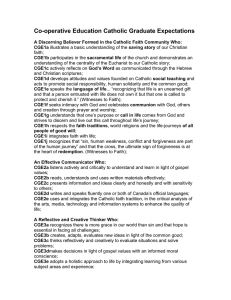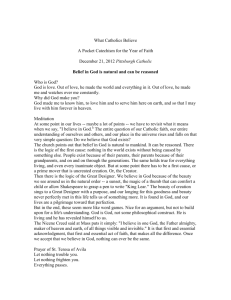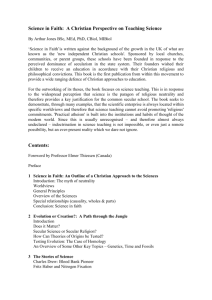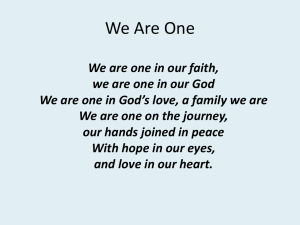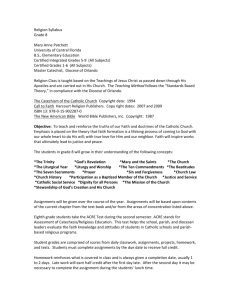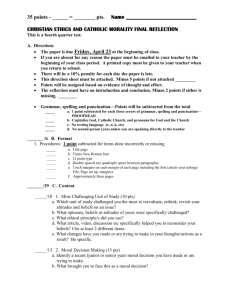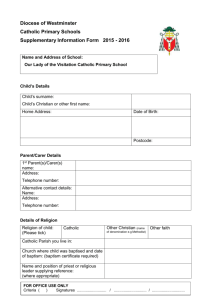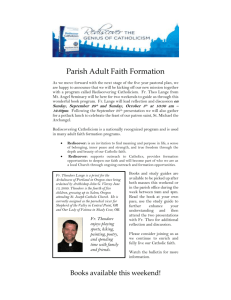Course Title
advertisement
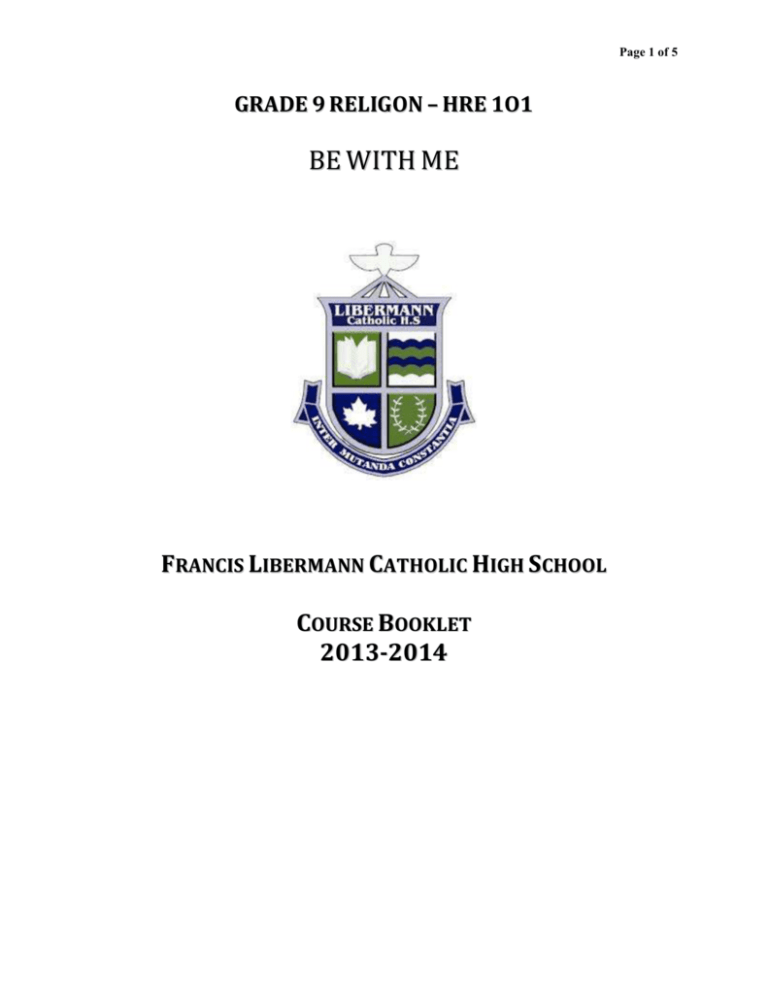
Page 1 of 5 GRADE 9 RELIGON – HRE 1O1 BE WITH ME FRANCIS LIBERMANN CATHOLIC HIGH SCHOOL COURSE BOOKLET 2013-2014 Page 2 of 5 COURSE INFORMATION SHEET DEPARTMENT: RELIGION DATE: 03/09/2013 SECONDARY SCHOOL: FRANCIS LIBERMANN CATHOLIC HIGH SCHOOL DEPARTMENT HEAD: MS. TUZI TEACHER: CURRICULUM POLICY DOCUMENT Institute for Catholic Education, Ontario Catholic Secondary Religious Education Curriculum Policy Document, 2006 COURSE TITLE Be With Me COURSE CODE HRE 101 PRE-REQUISITE None GRADE & TYPE 9, Open FULL YEAR / SEMESTER Full Year CREDIT VALUE 1 COURSE DESCRIPTION (AS SPECIFIED IN MINISTRY OF EDUCATION POLICY DOCUMENT) The primary text for this course is Be With Me. Using the Christian metaphor of ‘call’ and the archetype of ‘journey’, this course invites students into a conversation between their own story and the lived story of the Christian community. With eyes of faith, students will gaze through a lens filtered by Scripture, Profession of Faith, Christian Moral Development, Prayer, Sacramental Life, and Family Life in order to examine the attitudes and actions that characterize the Christian life, particularly in the areas of interpersonal relationships and sexuality. Students develop their understanding of Gospel values while actively engaging in a variety of challenging educational activities. LISTED IN ORDER OF INSTRUCTIONAL DELIVERY STRAND / UNIT TITLES HOURS UNIT 1: CALLED TO JOURNEY 18 UNIT 2: CALLED TO WHOLENESS 20 UNIT 3: CALLED TO LOVE 22 OVERALL EXPECTATIONS / UNIT DESCRIPTION This unit serves as an introduction and foundation to the course. Through the use of the five strands—Scripture, Profession of Faith, Christian Moral Development, Prayer and Sacramental Life, and Family Life—students investigate what it means to be ‘called to journey’. Students are called to examine the past, called to be themselves, called to relationship, called to understand religious experience, called to understand the nature of moral decision making, called to break open God’s Word, and called to deepen their relationships with God and others through prayer. This unit emphasizes the sacredness of life and the sacramentality of all creation through an examination of the creation story. The foundation of this unit is the analysis of the creation accounts of Genesis through an understanding of Hebrew cosmology. The question of how science informs faith and faith informs science is explored to further understand the sacredness of life in the creation account. Informed by the tension between faith and science, students are strongly encouraged to act as faithful stewards of creation. Images of God and Jesus lead students to an appreciation of God’s love for them in the Incarnation. Acknowledging that all life is sacred and that they are created by God, students will value their self worth, femaleness/maleness, and sexuality as gifts. This unit explores the biblical foundation of covenant. Students are encouraged to apply the Ten Commandments and Beatitudes to their own lives. The theme of relationships provides the focus for a discussion of covenant in the lives of students. 1 Corinthians 13 is used as the framework for examining healthy and broken personal relationships. Students explore the importance of healing and reconciling broken relationships. Page 3 of 5 UNIT 4: CALLED TO FREEDOM 20 UNIT 5: CALLED TO ACTION 20 UNIT 6: CALLED TO TRANSFORMATION 20 This unit examines the journey, both personal and societal, from slavery to liberation. Students explore the scriptural journey of Exodus and identify God who is active in human history and desires to be known both personally and communally. Jesus’ temptations and miracles poignantly show how life-affirming choices lead to freedom. Students understand the important of the formation of conscience in making choices that liberate. Students investigate negative societal messages that can limit personal freedom and development. Body image and eating disorders are examined as concrete examples. An understanding and celebration of Eucharist aids students in recognizing this sacrament as the ultimate act of liberation. This unit establishes Baptism, Confirmation, and Eucharist as the sacramental basis for discipleship. Students understand that discipleship follows from Christian vocation; it is a call to take on the attitude of Christ and a moral imperative for action. A scriptural examination of Jacob, the twelve tribes of Israel, the prophets Isaiah and Micah, the call of the Apostles, the parables, the washing of the feet, Jesus’ instruction to Peter to ‘feed my lambs’, and other related accounts lead to a thorough understanding of the concept of discipleship. Mary is examined as the model disciple. Students examine a modern day call to discipleship. This unit identifies the Paschal Mystery as the basis of the Christian faith. Through an examination of the elements of youth culture students identify the value of making choices of life over death. Students critique societal messages, which encourage them to embrace consumerism and objectify human persons. Students examine sexual abuse and harassment as concrete issues exemplifying the need to transform society. Students will view Jesus’ life, death, and resurrection as an invitation to find meaning, hope, and life in their relationships and experiences. Expectations of the Ontario Catholic School Graduate http://www.tcdsb.org/ice/Graduate_Expectations.html 1. 2. 3. 4. 5. 6. 7. A discerning believer formed in the Catholic Faith community who celebrates the signs and sacred mystery of God's presence through word, sacrament, prayer, forgiveness, reflection and moral living. An effective communicator who speaks, writes and listens honestly and sensitively, responding critically in light of gospel values. A reflective, creative and holistic thinker who solves problems and makes responsible decisions with an informed moral conscience for the common good. A self-directed, responsible, lifelong learner who develops and demonstrates their God-given potential. A collaborative contributor who finds meaning, dignity and vocation in work which respects the rights of all and contributes to the common good. A caring family member who attends to family, school, parish, and the wider community. A responsible citizen who gives witness to Catholic social teaching by promoting peace, justice and the sacredness of human life. STUDENT EVALUATION CRITERIA TERM – 70% 10 ≤ RELATIVE EMPHASIS / WEIGHTING ≤ KNOWLEDGE/UNDERSTANDING INQUIRY/THINKING COMMUNICATION APPLICATION TERM TOTAL FINAL REPORT CARD GRADE CALCULATION – 100% FINAL – 30% 40 20% 15% 15% 20% 70 RELATIVE EMPHASIS / WEIGHTING ISU (optional) Final Exam Without ISU FINAL TOTAL 10% 20% 30% 30 TERM TOTAL + FINAL TOTAL = REPORT CARD MARK Page 4 of 5 WRITTEN Multiple Choice Short Answer Open/Free Response Essay/Journal Papers/Reports Think/Pair/Share Case Study Conference ASSESSMENT FORMAT USED (EXAMPLES PROVIDED) PERFORMANCE OTHER Group Visuals Debates Teacher Observation Carousel Interviews Extended Investigations Portfolios Projects Skills Checklist Concept Mapping Socratic Presentation Vee Heuristic Focus Groups Media Presentation Jigsaw Presentations TEXTBOOK STUDENT MATERIALS EXCURSIONS COMPUTER USE COURSE RELATED WEBSITES RESOURCES (EXAMPLES PROVIDED) Be With Me Electronic, photocopies, 3-ring binder, pens, pencils, pencil crayons, ruler, glue Grade level retreat Encouraged Provided on request POLICIES & PROCEDURES (EXAMPLES PROVIDED) PLAGIARISM, LATE Refer to school/departmental policy ASSIGNMENTS, MISSED WORK, ABSENCES, HOMEWORK TEACHER CONTACTS Provided in class REPORTING DATES Page 5 of 5 LEARNING SKILLS CRITERIA IN EACH REPORTING PERIOD, REPORT ON THE QUALITY OF THE LEARNING SKILLS DEMONSTRATED BY THE STUDENT IN EACH OF THE CATEGORIES IDENTIFIED ON THE REPORT CARD USING THE FOLLOWING LETTER SYMBOLS. E–EXCELLENT G–GOOD S–SATISFACTORY N–NEEDS IMPROVEMENT SKILL: WORKS INDEPENDENTLY INDICATORS: • accomplishes tasks independently • accepts responsibility for completing tasks • follows instructions • regularly completes assignments on time and with care • demonstrates self-direction in learning • independently selects, evaluates, and uses appropriate learning materials, resources, and activities • demonstrates persistence in bringing tasks to completion • uses time effectively • uses prior knowledge and experience to solve problems and make decisions • reflects on learning experiences SKILL: ORGANIZATION INDICATORS: • organizes work when faced with a number of tasks • devises and follows a coherent plan to complete a task • follows specific steps to reach goals or to make improvements • revises steps and strategies when necessary to achieve a goal • manages and uses time effectively and creatively • demonstrates ability to organize and manage information • follows an effective process for inquiry and research • uses appropriate information technologies to organize information and tasks SKILL: INITIATIVE INDICATORS: • seeks out new opportunities for learning • responds to challenges and takes risks • demonstrates interest and curiosity about concepts, objects, events, and resources • seeks necessary and additional information in print, electronic, and media resources • identifies problems to solve, conducts investigations, and generates questions for further inquiry • requires little prompting to complete a task, displaying selfmotivation and self-direction • approaches new learning situations with confidence and a positive attitude • develops original ideas and devises innovative procedures • attempts a variety of learning activities • seeks assistance when needed • uses information technologies in creative ways to improve learning for self or others SKILL: TEAMWORK INDICATORS: • works willingly and cooperatively with others • shares resources, materials, and equipment with others • responds and is sensitive to the needs and welfare of others • solves problems collaboratively • accepts various roles, including leadership roles • takes responsibility for his or her own share of the work to be done • works to help achieve the goals of the group or the class • helps to motivate others, encouraging them to participate • contributes information and ideas to solve problems and make decisions • questions the ideas of the group to seek clarification, test thinking, or reach agreement • shows respect for the ideas and opinions of others in the group or class • listens attentively, without interrupting • in discussions, paraphrases points of view and asks questions to clarify meaning and promote understanding • recognizes the contribution of group members by means of encouragement, support, or praise • seeks consensus and negotiates agreement before making decisions SKILL: WORK HABITS/HOMEWORK INDICATORS: • begins work promptly and uses time effectively • completes homework on time and with care • perseveres with complex projects that require sustained effort • puts forth consistent effort • applies effective study practices • follows directions • shows attention to detail • uses materials and equipment effectively NOTE: The above chart is a reformatting of the skills identified in the Ministry of Education’s Guide to the Provincial Report Card, Grades 9 – 12 : Appendix C: pages 27 to 29 .
